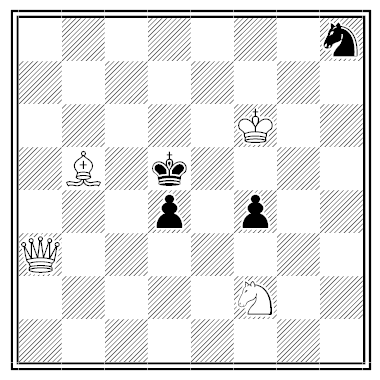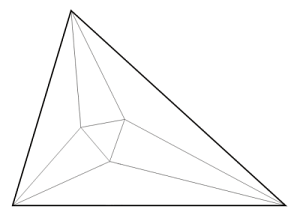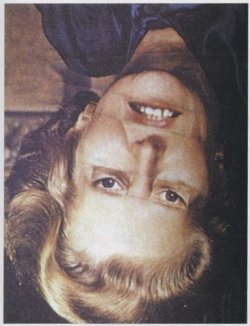Kokichi Sugihara of Japan’s Meiji Institute for Advanced Study of Mathematical Sciences has won first prize in the Neural Correlate Society’s sixth annual “Best Illusion of the Year” contest:
The top 10 finalists are here.
Kokichi Sugihara of Japan’s Meiji Institute for Advanced Study of Mathematical Sciences has won first prize in the Neural Correlate Society’s sixth annual “Best Illusion of the Year” contest:
The top 10 finalists are here.
Honest Jack Fuller, who is buried in a pyramidal mausoleum in Brightling churchyard, in Sussex, gave as his reason for being thus disposed of, his unwillingness to be eaten by his relations after this fashion: ‘The worms would eat me, the ducks would eat the worms, and my relations would eat the ducks.’
— John Timbs, English Eccentrics and Eccentricities, 1875
babery
n. finery to please a baby
scarebabe
n. a thing that frightens a baby
Very little is known about Theophilus Thompson, a chess problemist who was born a slave in Maryland in 1855. That’s a pity, because his work is often beautiful. Here’s a sample:

White to mate in two.
In October 1962, during the Cuban Missile Crisis, a group of American destroyers trapped a Soviet submarine near Cuba. When the ships began dropping depth charges, the sub’s captain prepared to launch a nuclear-tipped torpedo, believing that a war between the superpowers might already be under way.
But the launch was permitted only if three officers agreed to it, and second-in-command Vasili Arkhipov held out against his superior. An argument ensued, but eventually he persuaded the captain to surface instead and seek orders from Moscow.
“The lesson from this,” remarked NSA director Thomas Blanton in 2002, “is that a guy called Vasili Arkhipov saved the world.”
See Close Call.

Trisect the angles of any triangle and you’ll find an equilateral triangle at its heart.
This theorem has a curious cousin: If you trisect the sides of any triangle and erect an equilateral triangle outwardly on the middle third of each leg, then the outermost vertices of these equilateral triangles will themselves form an equilateral triangle.
A Frenchman, while looking at a number of vessels, exclaimed, ‘See what a flock of ships!’ He was told that a flock of ships was called a fleet, but that a fleet of sheep was called a flock. To assist him in mastering the intricacies of the English language, he was told that a flock of girls was called a bevy, that a bevy of wolves is called a pack, but that a pack of cards is never called a bevy, though a pack of thieves is called a gang, and a gang of angels is called a host, while a host of porpoises is termed a shoal. He was told that a host of oxen is termed a herd, and a herd of children is called a troop, and a troop of partridges is termed a covey, and a covey of beauty is called a galaxy, and a galaxy of ruffians is called a horde, and a horde of rubbish is called a heap, and a heap of bullocks is called a drove, and a drove of blackguards is called a mob, and a mob of whales is called a school, and a school of worship is called a congregation, and a congregation of engineers is called a corps, and a corps of robbers is called a band, and a band of locusts is called a crowd, and a crowd of gentlefolks is called the elite. The last word being French, the scholar understood it and asked no more.
— Charles William Bardeen, A System of Rhetoric, 1884
The British merchant cruiser Hilary was patrolling the North Sea in 1917 when commander F.W. Dean was called to the bridge to witness a “living thing” on the starboard quarter.
“The head was about the shape of, but somewhat larger than that of, a cow,” Dean recalled three years later in Herbert Strang’s Annual, “though with no observable protrusions such as horns or ears, and was black, except for the front of the face, which could be clearly seen to have a strip of whitish flesh, very like a cow has, between its nostrils. As we passed, the head raised itself two or three times, apparently to get a good look at the ship.”
Dean estimated that the creature was 60 feet long and ordered his men to use it for target practice. The first two crews missed it, but the third hit “and produced at once a furious commotion, which reminded me more than anything else of a bather lying on his back in smooth water and kicking out with all his force to splash the water.” The creature disappeared.
All this was noted in the log, over the objections of a superstitious crewman who insisted it was bad luck to record such encounters. Two days later, Hilary was torpedoed and sank. “If you ask me ‘Am I superstitious about seeing a sea-serpent?'” Dean wrote, “I only reply, ‘Well, if ever I found myself again at sea in command of a ship, and anything of the sort was sighted, I should leave it alone and make no entry in the log!'”

When we look at another person’s face, her eyes and mouth convey the most information about her mood.
Indeed, when a face is inverted we can have trouble recognizing it because we can’t read its expression.
So in 1980 University of York psychologist Peter Thompson tried inverting everything but the eyes and mouth.
Most people can recognize the face at left and assign a mood to it, but they’re often surprised to see it right side up.
“Further research into this illusion might help determine whether face recognition is a serial or parallel process,” Thompson wrote in Perception that summer. “It might even tell us something about Margaret Thatcher.”
The Musical World of London, Nov. 28, 1874, reports a surprising project — apparently a Massachusetts composer set the entire American constitution to music:
The authors of the Constitution of the Union thought more of reason than of rhyme, and their prose is not too well adapted to harmony, but the patriotic inspiration of Mr. Greeler, the Boston composer, overcomes every difficulty. He has made his score a genuine musical epopœia, and had it performed before a numerous public. The performance did not last less than six hours. The preamble of the Constitution forms a broad and majestic recitative, well sustained by altos and double basses. The first clause is written for a tenor; the other choruses are given to the bass, soprano, and baritone. The music of the clause treating of state’s rights is written in a minor key for bass and tenor. At the end of every clause, the recitative of the preamble is re-introduced and then repeated by the chorus. The constitutional amendments are treated as fugues and serve to introduce a formidable finale, in which the big drum and the gong play an important part. The general instrumentation is very scholarly, and the harmony surprising.
The music has been lost, but it would be out of date now anyway — we’ve added 12 amendments since then.